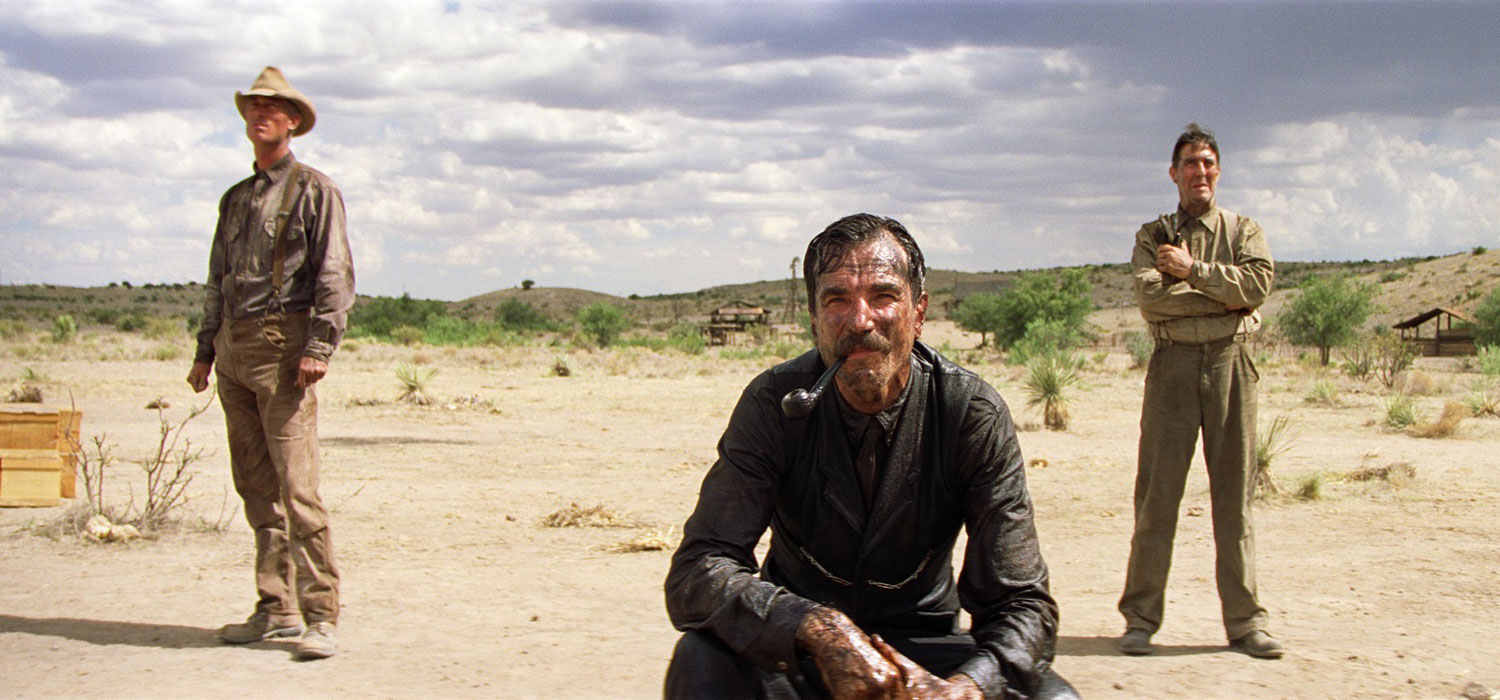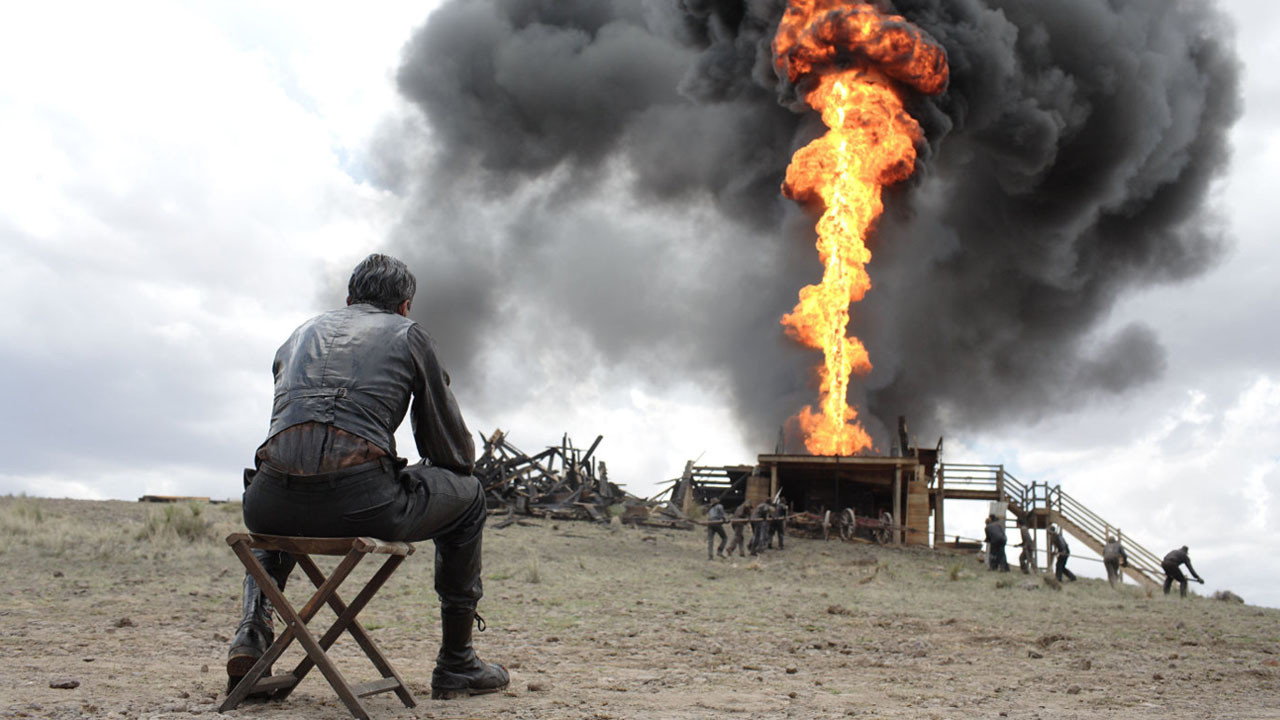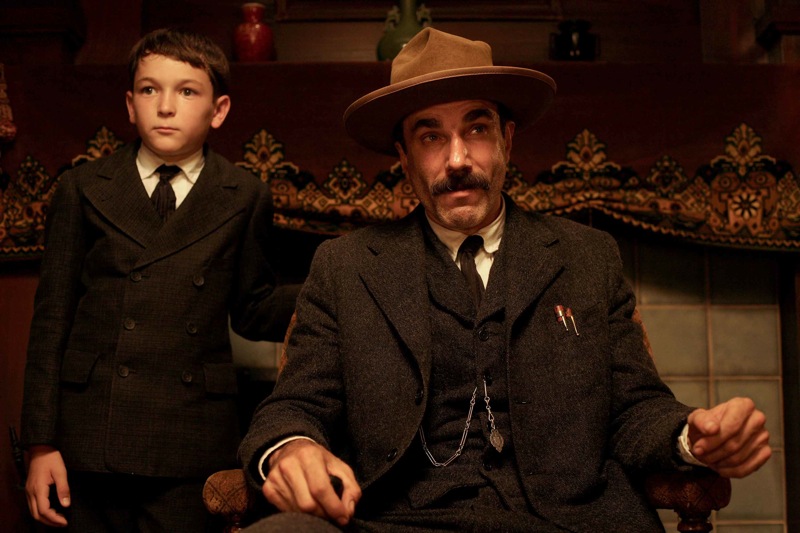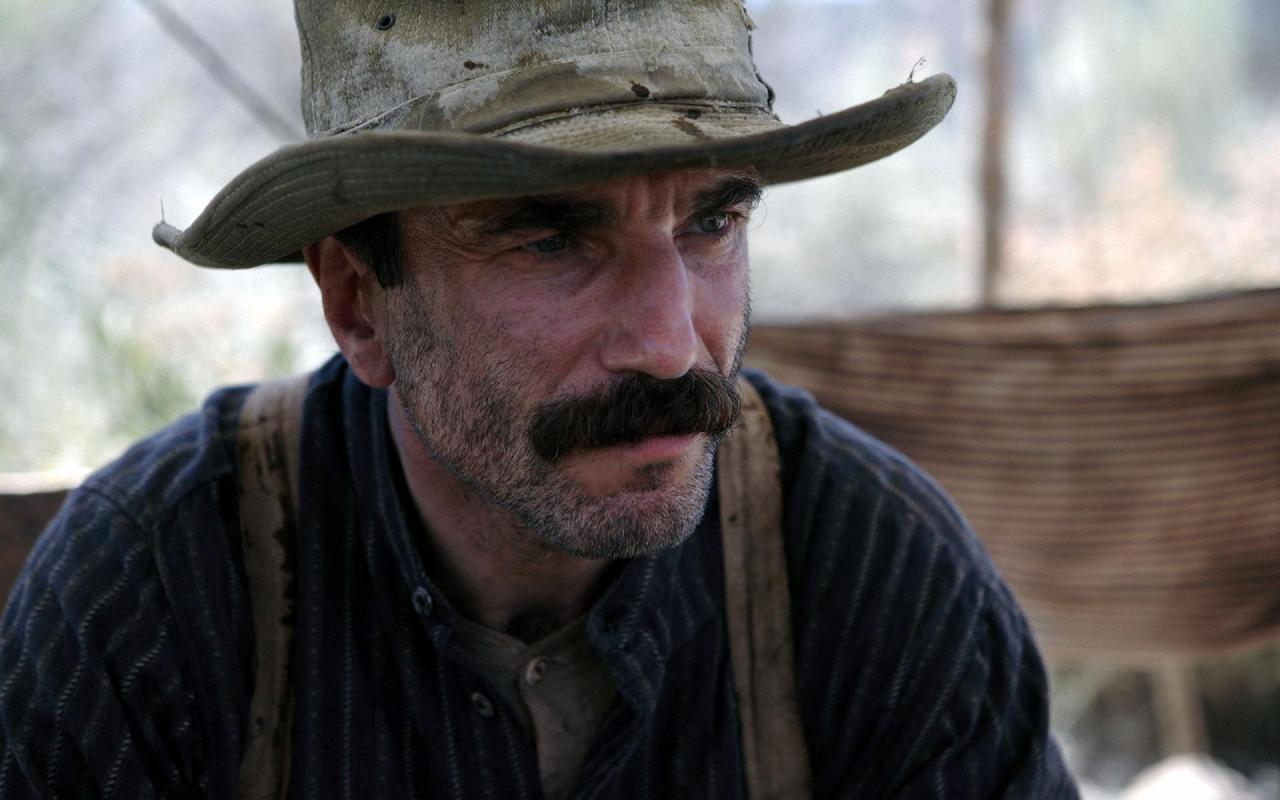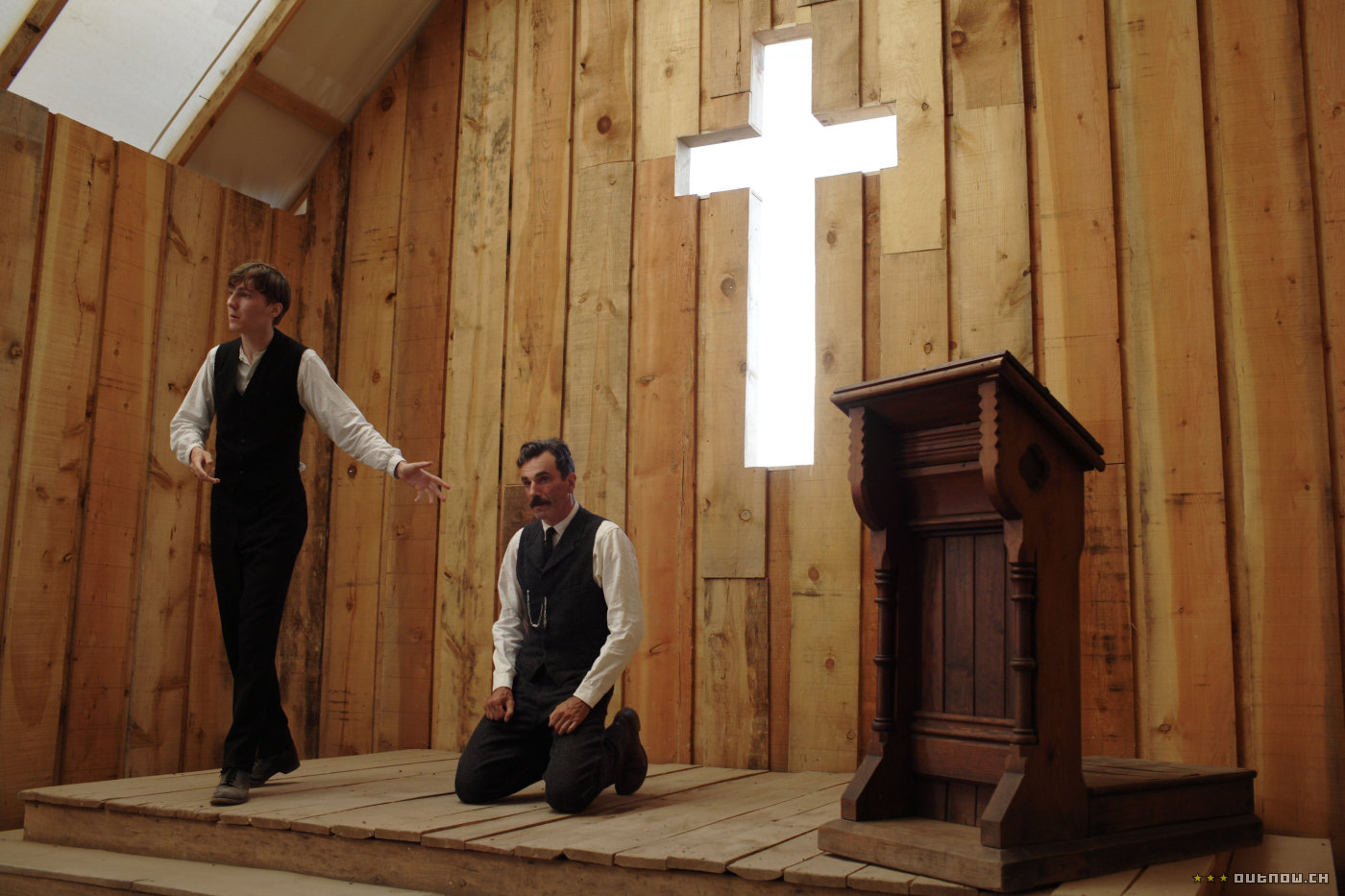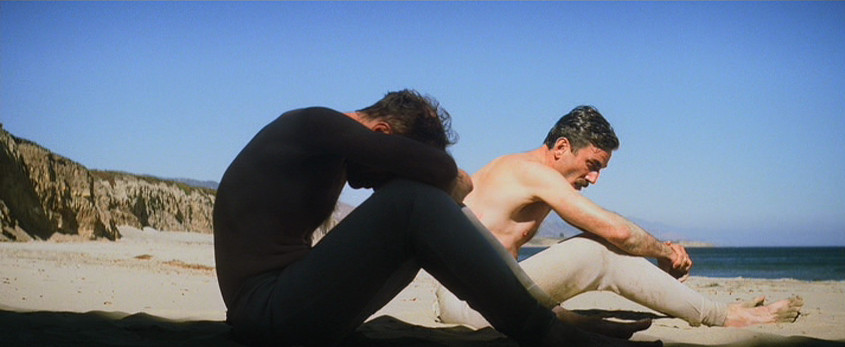Written and directed by cinematic great Paul Thomas Anderson, There Will Be Blood is loosely based on Upton Sinclair’s 1927 novel ‘Oil’. Following the rise and rapid decline of self proclaimed “oil man” Daniel Plainview, whose fall from grace is less than noble, this film is known for the haunting, Oscar winning performance of Daniel Day-Lewis in the leading role.
Undeniably epic, there is never a dull moment. At 158 minutes you’re in for the long haul, but even the slow, scenic panning shots are unlike no other, especially since they’re accompanied by Johnny Greenwood’s incredibly memorable score.
1. The Opening Scene
The film’s title appears on screen in white against a black background, the gothic font instantly evoking biblical undertones. The first shot is a wide and barren landscape, accompanied with an eerie score, filling the audience with unease.
The score is almost like that of a horror movie, instantly intriguing the audience. Relatively uncommon in cinema today, this opening sequence is essentially it’s own silent film, a dialogue-free, mesmerising introduction of just under 15 minutes. It is the year 1898 and we see Plainview working in extremely rigorous and labour intensive conditions, but this seems to push him harder rather than deter him. These harsh and dangerous working conditions work to show us how committed Plainview is to his cause, willing to put himself and the workers around him in life threatening conditions.
There is absolutely no need for dialogue, as the visuals speak for themselves. The introduction of Plainview as a hardworking man with endless ambition foreshadows the narrative and shows us he is willing to risk everything to conquer.
One of Plainview’s workers is killed on the job and leaves an infant behind. Plainview is ill equipped to be a father, but like most things in his life, he sees the young child as an investment, a tool to further himself.
At the end of the opening sequence, Plainview and his new son HW are riding off on a train, one of the only times throughout There Will Be Blood that warmth and comfort pours from the otherwise stoic man. It is obvious that he has adopted HW as his own and initially it seems as though Plainview has formed a bond with the child, as the infant seems enamoured with him.
The next time we see Plainview – 13 years later – he has emerged as a grandiose figure, immensely self-assured and confident.
2. Timeless Themes
Old fashioned but forever relevant, the central themes of There Will Be Blood are timeless. This is the story of the loss of one man’s soul as he rises to riches, encompassing religion, money, greed and power, all just as relevant now as they were when the film was set.
There Will Be Blood undoubtedly transcends the time in which it was set and is a prelude to the driving force of American capitalism we were to see in the 20th century. More prevalent than ever, oil is the foundation of American greed and religion is the cause of most conflicts, just as they are throughout the film.
Plainview claims to be all about equal distribution of wealth in his search for oil. Quite early on he tells his audience he hopes they’ll forgive good old-fashioned plain speaking. His surname is no coincidence. Labelling his work as a ‘family enterprise’, he is moving himself further away from the lone, dictator he truly is.
The people of Little Boston are captivated by his self-assured nature and his use of large words and persuasive language. They believe he is there for a mutually beneficial deal, but we know this isn’t the case. This is very much an all too familiar instance of the illiterate being taken advantage of simply because they are susceptible to a spectacle put on by a confident and well spoken man. They simply don’t know any better.
3. Daniel Day-Lewis
There Will Be Blood is Daniel Day Lewis’s film. He is in almost every scene, his presence always commanding. Even for the brief moments where he isn’t on the screen he is always on the minds of the audience.
It was as though the Academy Award was in his hands from the moment he stepped into Plainview’s shoes and rightfully so. There Will Be Blood gave Day-Lewis the opportunity to raise the bar even higher than before. Day-Lewis transforms into an enormous and hypnotic figure, looking down on everyone around him. He displays a rainbow of human behaviour, but specialises in the loathing of mankind, which includes himself.
While Paul Dano gives an incredible supporting performance, it is hard to leave There Will Be Blood thinking about anyone but Day-Lewis. From his voice to his stoicism, there is no doubt this film could not have been made without him.
4. The Constant Clash Between Two Egos
At the heart of There Will Be Blood is the relationship between Plainview and the seemingly naïve and innocent Eli. While it is easy to label Plainview as the sole antagonist, it is very important to remember that both men are corrupt and consumed by their cause.
Their relationship throughout the film is a constant confrontation. When negotiating the cost to drill on the Sunday’s land, Eli mentions there is in fact something that Plainview doesn’t know. While this might cement Plainview’s frustration and contempt for him very early on, he has the last laugh as Eli’s capacity to do business is incredibly limited. Plainview takes full advantage of his ignorance and lack of experience to pay him and his family less than they deserve.
Money is everything to Plainview and it is oil, not blood that runs through his veins. He tells Eli he’ll happily be a supporter of his church for as long as possible, but this is no philanthropy, it is entirely self-serving. While Eli still needs money in order for his church to survive, the battle between him and Plainview is essentially one of God vs money – Eli is a prophet of God while Plainview is a prophet of profit.
Plainview looks upon the workings of the church with disdain, as there is no God in his eyes. He also believes there is nothing worse than spiritual fraudulence, which is why he despises Eli and wants nothing more than to bring about his downfall He doesn’t want any help from the church and when Eli stresses the importance of blessing the well, Plainview can’t even feign an interest, subtly patronising him then speeding through the service with no regard for the religious folk of the town.
Plainview tells the crowd he is better at drilling holes in the ground than making speeches, but we know this isn’t true. He is all about the power of words, however when it comes to religion and God, he has nothing to say and wants absolutely nothing to do with any kind of practice. Plainview takes great pride in slapping Eli around when he gets the chance, but Eli gets his revenge when Plainview is forced into being baptised for a business deal.
5. Breathtaking Cinematography
There Will Be Blood occurs primarily outdoors, which is integral to the story. Plainview communicates best with the earth, as we know he has little to no need for people.
Cinematographer Robert Elswit, who had shot all of Paul Thomas Anderson’s previous features; Hard Eight, Boogie Nights, Magnolia and Punch Drunk Love picked up an Academy Award for his work on There Will Be Blood and rightfully so. Full of long tracking shots along empty landscapes, Elswit was able to transform barren surroundings to postcard views.
While the colour scheme is predominantly dark, in accordance with the colours of soil and the earth, throughout the film’s entirety we are exposed to a full colour palate. We see rich greens from the bushland, to fiery oranges and yellows during the oilrig explosion. This creates an intense visual, making the story even more grandiose.
Plainview’s men run around and try to contain the fire and the monster they have unleashed. Plainview exclaims, “What are you looking so miserable about? There’s a whole ocean of oil under our feet!” Covered in oil and almost blending into the night behind him, he would rather sit by and watch the flames than attend to his injured child. As soon as HW is deemed damaged goods, he is of no real use and therefore tossed aside.
This scene of darkness and disarray is juxtaposed with one of the more beautiful and telling shots. It takes place when Plainview and his ‘brother’ Henry are on the beach after swimming in the ocean. Seeing Plainview in the bright light of day, both in the clear ocean and on the sand, might be the most pure we see him in the entire film.
Due to a slip of the tongue, Plainview finally sees Henry for what he is, an imposter. The camera pulls back to show the two men sitting on the sand, Henry with his head in his hands in the shadows, and Plainview looking down on him in the sunshine. Showing Plainview in the light doesn’t last long, however, with the realisation plunging him to a darker place than ever before.
